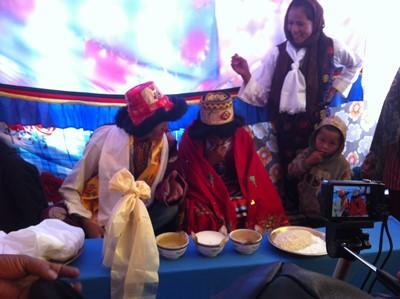
In Syuba society, both men and women have equal social status. Some families are run by male leadership and some are by female leadership. Therefore, there is not much gender discrimination among the Syuba. Land is registered and passed down to sons or grandsons, but not to their daughters. Syuba culture is to respect the eldest person among the clan, especially during a festival period. People go to meet the person to offer some liquor, meat, or other item.
It is also common in their culture for decisions to be made according to counsel from the head leadership in the village. For people who come from outside to help develop their community, the Syuba provide hospitality, food and a room to stay because most Syuba people have a big house and some of them even own two or three houses. Their culture includes helping each other when necessary and volunteering services for community development such as building roads and sewers. Also when someone is sick, they help carry the person to hospital and even give him or her some financial help as well.
In Syuba villages, either a man or woman can be the leader for community development. or any case of need. In any case of need Syuba communities also exchange help with other Syuba communities. If someone needs to be punished, the decision is made by a majority, but the decision is announced by the village head or leader.
Amongst themselves Syuba people speak both their own language and Nepali. These days some speak Hindi or English too. Previously parents used to teach their children, but it was not done systematically. Also, they used to treat any common sickness, like cold, diarrhea, or fever, with homemade herbal medicine, but these days they use modern medicine.
In regard to dress, culture, and language, they are very close to Yolmo, Lhowa, Lhomi, and Helambu Sherpa. These ethnic groups consider each other as relatives. Many clubs or groups have developed associations with the Yolmo people. The Syuba people always have a good attitude towards foreign guests and love any kind of development. They welcome guests from their heart.